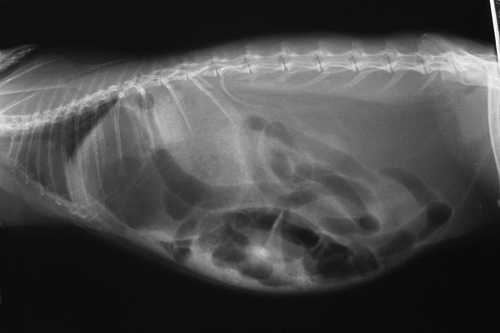Difference between revisions of "Rabbit Medicine and Surgery Q&A 08"
Ggaitskell (talk | contribs) (Created page with "{{Template:Manson Keeble Meredith}} centre|500px <br /> '''A two-year-old neutered female presents with a one-day history of anorexia and mild...") |
|||
| Line 13: | Line 13: | ||
|a1= | |a1= | ||
Widespread gaseous distension of the intestines indicates that non-obstructive ileus is present. | Widespread gaseous distension of the intestines indicates that non-obstructive ileus is present. | ||
| − | |l1= | + | |l1=Non-Obstructive Ileus – Rabbit#Diagnosis |
|q2=What factors can affect gut motility? | |q2=What factors can affect gut motility? | ||
|a2= | |a2= | ||
| Line 29: | Line 29: | ||
*ingestion of toxins (e.g. lead); | *ingestion of toxins (e.g. lead); | ||
*foreign body. | *foreign body. | ||
| − | |l2= | + | |l2=Non-Obstructive Ileus – Rabbit |
|q3=What treatment would you initiate? | |q3=What treatment would you initiate? | ||
|a3= Treatment should consist of: | |a3= Treatment should consist of: | ||
| Line 38: | Line 38: | ||
#Exercise – helps to stimulate GI motility. | #Exercise – helps to stimulate GI motility. | ||
#Simethicone (20–40 mg/kg p/o q6h) may be useful if large amounts of gas are present. | #Simethicone (20–40 mg/kg p/o q6h) may be useful if large amounts of gas are present. | ||
| − | |l3= | + | |l3=Non-Obstructive Ileus – Rabbit#Treatment |
</FlashCard> | </FlashCard> | ||
Latest revision as of 12:17, 11 August 2011
| This question was provided by Manson Publishing as part of the OVAL Project. See more Rabbit Medicine and Surgery questions |
A two-year-old neutered female presents with a one-day history of anorexia and mild depression. Clinical examination is unremarkable except for a slightly distended abdomen and lack of borborygmi. A lateral abdominal radiograph is taken.
| Question | Answer | Article | |
| What condition is seen in this radiograph? | Widespread gaseous distension of the intestines indicates that non-obstructive ileus is present. |
Link to Article | |
| What factors can affect gut motility? | Control of GI motility is complex. Motility is under the influence of the autonomic nervous system, prostaglandins and other hormones such as motilin.
|
Link to Article | |
| What treatment would you initiate? | Treatment should consist of:
|
Link to Article | |
